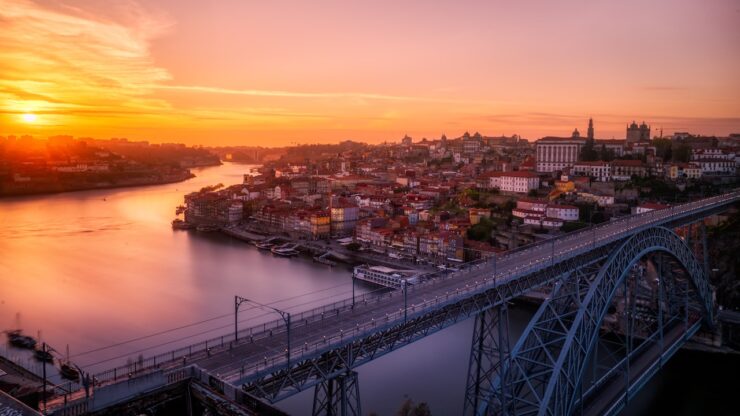Over the past few years, Portugal has grown in popularity as a retirement destination thanks to big selling points like its lower cost of living, fantastic weather, and residency visas that are aimed at retirees.
But while there are a lot of upsides to living in Portugal, there are one or two downsides as well.

Pros of Retiring in Portugal
Beautiful, fantastic food, and welcoming people – the pros of living in Portugal are almost endless, but three pros that stand out are the lower cost of living, the great weather, and the attainable residency visas.
The Cost of Living
One of the main draws of Portugal is its affordability. Portugal isn’t as affordable as Puerto Escondido or other parts of Mexico, but it is affordable by European standards and certainly by North American standards.
Here, an espresso coffee costs between €0.50 and €1.00, a glass of wine as little as €1, and a 3-course lunch menu between €8 and €15.
Rent and property purchase prices have increased, as with most other countries, but it is still possible to rent a 1 or 2-bedroom apartment in most of the country for between €600 and €1,000.
If you’re looking to retire in a European country, but need the cost of living to be minimal, Portugal should be top of your list.
The Weather
Portugal enjoys some of the best weather in Europe, particularly in the Algarve which stays mild throughout the winter months.
During December, daily temperatures can reach 20°C (around 68°F) which might not be warm enough for swimming – even in summer many people say it’s too cold for swimming – but is definitely warm enough to walk around in very few layers.
Summers are warmer, particularly inland and in regions like the Alentejo or Castelo Branco. The exception is the island of Madeira, which has a mild temperature year-round and rarely gets above 20°C (around 68°F) in summer.
Attainable Retirement Visas
Portugal offers a number of residency permits that are suitable for retirees. The golden visa is aimed at those with cash to invest (investment options start from €280,000) and allows investors to invest in property, funds, or businesses in Portugal while the D7 is aimed at those with a passive income, such as a pension.
The D7 is particularly appealing because applicants only need to show a monthly income that’s above the
Portuguese minimum wage, which in 2023 is a little less than €800 per month. This income could come from sources such as a pension, social security, rental income, dividends, or royalties.
But while the D7 is attainable due to a low minimum income threshold, applicants still have to jump through a number of hoops.
Many consulates require a Portuguese fiscal number, funded Portuguese bank account, and Portuguese address (e.g. rental lease or deeds to a property) at the application stage.
There are companies that can help you obtain these requirements – the cost of obtaining a NIF through one of these companies starts at around €80 according to Portugalist and at least one bank will open an account remotely for free – obtaining all of these documents will still take a lot of time and effort.
However, given that applicants can apply for Portuguese citizenship after just 5 years of living in Portugal, an ever-increasing number of applicants believe these are all hoops worth jumping through.
Tax-funded Healthcare
Like most European countries, Portugal has a large public healthcare system. This is funded by taxes – as opposed to paid for by insurance companies or out of pocket – which means you’ll never be presented with a huge bill just for using it.
Backlogs are an issue in Portugal, and many retirees choose to pay for private health insurance so that they can use the private system for smaller procedures and visits.
However, even though the Portuguese healthcare system has some issues, having access to a public healthcare system is a big selling point that sets Portugal apart from most Asian or Latin American countries.
The Cons of Retiring in Portugal
Nowhere is perfect and, like everywhere else, there are a few downsides to retiring in Portugal.
Bureaucracy
Visit any Facebook group for expats living in Portugal and the biggest complaint is bureaucracy. Unfortunately, getting things done in Portugal usually takes a lot longer than it should, and involves a lot more paperwork than you might expect.
Many people choose to hand their paperwork woes over to a lawyer but, naturally, there’s a cost to this.
Thankfully, it’s possible to do a lot of the paperwork yourself, it just means that you will have to dedicate a lot of time and effort to getting even simple issues resolved.
Housing Issues
There are lots of property bargains to be found in Portugal but buyers should be aware that some older properties may lack insulation, which means that they have poor sound-proofing and can get cold (and moldy) in the winter time.
There are solutions, including the option of renovating the property yourself, but it is something to be aware of when considering moving here.
Tourism Problems
Portugal isn’t just a popular destination for expats, but for tourists as well. Every year, Portugal attracts millions of visitors from all over the world, who come to explore Portugal’s beautiful cities and relax on its beautiful beaches.
Unfortunately, this means that some parts of Portugal can get pretty crowded during the summer months. It also has a big effect on rental prices and availability.
The Algarve, Lisbon, and Porto are probably the worst affected, but you will also notice the effects of tourism in smaller cities like Aveiro and Évora.
If you want to live in a coastal region that isn’t overrun with tourists, you should focus on less popular locations like the North of Portugal. If you completely want to avoid tourists, focus on inland locations, such as those close to the Spanish border.
The Language
There are definitely some challenges to learn European Portuguese, particularly pronunciation and understanding native speakers.
Another downside (that is also an upside) is that English is so widely spoken that it can sometimes be difficult to get opportunities to practice your Portuguese: most people just switch to English.
But despite its challenges, Portuguese isn’t considered an incredibly complicated language to learn. Like any world language, it just takes a lot of practice and studying.
Conclusion
There are pros and cons to living in any country, and Portugal is no exception. While some of the downsides can be challenging, particularly issues like bureaucracy or the quality of the housing, most expats feel they are a small price to pay for upsides like a lower cost of living, warm weather (particularly during winter), and the possibility of being able to apply for an “EU” passport after 5 years of living there.
